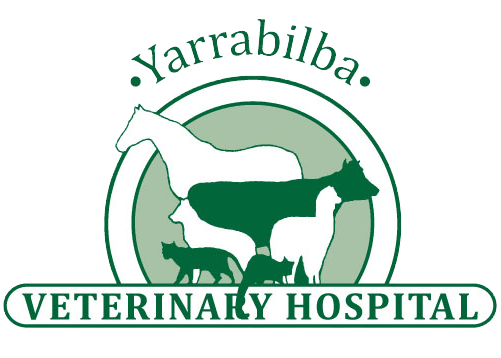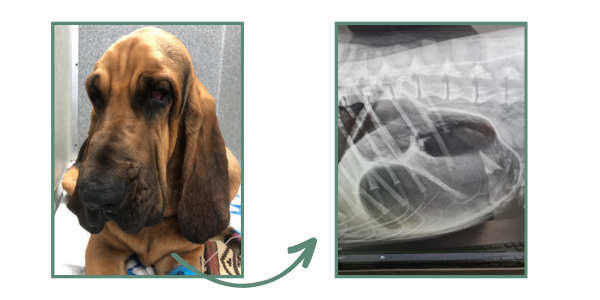Moses the 11-month-old Bloodhound recently presented to our Yarrabilba clinic with GDV (gastric dilation and volvulus).
GDV, or Gastric Dilatation-Volvulus, is a serious and potentially life-threatening condition in dogs. It commonly affects large, deep-chested breeds, but can occur in any dog. GDV occurs when the stomach becomes distended with gas and then rotates or twists on its axis, causing a blockage of blood flow and preventing the normal release of gas from the stomach.
The symptoms of GDV can include:
- Abdominal distension: The dog’s abdomen becomes visibly swollen or distended. It may feel tight and firm to the touch.
- Unsuccessful attempts to vomit: The dog may repeatedly try to vomit or retch but be unable to bring anything up. This is known as unproductive retching.
- Restlessness and pacing: The dog may appear anxious, restless, or uncomfortable. It may be unable to find a comfortable position and may continuously pace or wander.
- Excessive drooling: GDV can cause increased salivation or drooling in dogs. The dog’s mouth may be wet and have excessive foam or saliva.
- Non-productive attempts to defecate: The dog may strain or squat to defecate but be unable to pass stool. This is due to the blockage caused by the twisted stomach.
- Rapid breathing and panting: Dogs with GDV may exhibit rapid, shallow breathing or panting. They may also have an increased heart rate.
- Pale gums and weak pulse: As the condition progresses, the dog’s gums may appear pale or white, indicating poor blood circulation. The pulse may become weak or difficult to detect.
- Collapse or shock: In severe cases, the dog may collapse, go into shock, or become unresponsive. This is a medical emergency requiring immediate veterinary attention.
Prevention
Gastric Dilatation-Volvulus (GDV), also known as bloat, is a serious and potentially life-threatening condition that commonly affects large and deep-chested dog breeds. While it is not always possible to completely prevent GDV, there are some measures you can take to reduce the risk.
Here are some recommendations:
- Feed smaller, frequent meals: Instead of feeding one large meal a day, divide your dog’s daily food into smaller portions and feed them throughout the day. This can help prevent overeating and reduce the likelihood of the stomach becoming overly distended.\2. Ue elevated feeding bowls: Feeding your dog from an elevated bowl can help promote slower eating and better digestion. Elevated bowls can also reduce the amount of air your dog ingests while eating, which can contribute to GDV.
- Avoid exercise immediately before and after meals: Vigorous exercise or activity right before or after a meal can increase the risk of GDV. Allow your dog to rest for at least one hour before and after meals to aid in proper digestion.
- Control the rate of eating: Some dogs tend to eat their food too quickly, which can lead to gulping down air along with their food. You can use specialized slow-feed bowls or food-dispensing toys to slow down their eating pace.
- Avoid stress during mealtime: Minimize stress or anxiety during your dog’s mealtime. Some dogs can become anxious or agitated during feeding, which may contribute to swallowing air. Provide a calm and quiet environment for your dog while eating.
- Avoid excessive water consumption: Limit your dog’s water intake immediately before and after meals. Drinking excessive amounts of water can contribute to the stomach becoming distended.
- Consider a gastropexy surgery: If you have a high-risk breed or a dog with a history of GDV in their lineage, you may discuss with your veterinarian the option of a prophylactic gastropexy surgery. This surgical procedure involves attaching the stomach to the abdominal wall, which can greatly reduce the risk of stomach torsion.
- Be aware of symptoms: Familiarize yourself with the signs and symptoms of GDV, such as unproductive retching, restlessness, distended abdomen, rapid shallow breathing, and weakness. If you suspect GDV, seek immediate veterinary assistanc
Remember, while these measures can help reduce the risk of GDV, they do not guarantee prevention. It is always important to consult with your veterinarian for personalized advice and to discuss any concerns you may have about your dog’s health.
The team at Yarrabilba is happy to say that after performing diagnostic radiology and gastropexy surgery, Moses has had a full recovery and is back to being himself.
If you suspect your dog is experiencing GDV, it is crucial to seek veterinary assistance immediately, as GDV can be fatal if not treated promptly.



